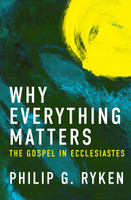
Ryken, Philip Graham
Description
Since the days of the early church, Christians have wrestled with the relationship between the law and gospel. If, as the apostle Paul says, salvation is by grace and the law cannot save, what relevance does the law have for Christians today?
By revisiting the Marrow Controversy—a famous but largely forgotten eighteenth-century debate related to the proper relationship between God’s grace and our works—Sinclair B. Ferguson sheds light on this central issue and why it still matters today. In doing so, he explains how our understanding of the relationship between law and gospel determines our approach to evangelism, our pursuit of sanctification, and even our understanding of God himself.
Ferguson shows us that the antidote to the poison of legalism on the one hand and antinomianism on the other is one and the same: the life-giving gospel of Jesus Christ, in whom we are simultaneously justified by faith, freed for good works, and assured of salvation.
Contents
Endorsements
“The volume in your hands is not just a helpful historical reflection but also a tract for the times. Sinclair does a good job of recounting the Marrow Controversy in an accessible and interesting way. However, his real aim is not merely to do that. Against the background and features of that older dispute, he wants to help us understand the character of this perpetual problem—one that bedevils the church today. He does so in the most illuminating and compelling way I’ve seen in recent evangelical literature.”
—Timothy J. Keller, Pastor, Redeemer Presbyterian Church, New York City; best-selling author, The Reason for God
“This book has three things I’m very interested in: eighteenth-century Scottish church history, doctrinal clarity on the gospel, and learning from Sinclair Ferguson. As fascinating as this work is as a piece of historical analysis, it is even more important as a careful biblical and theological guide to the always-relevant controversies surrounding legalism, antinomianism, and assurance. I’m thankful Ferguson has put his scholarly mind and pastoral heart to work on such an important topic.”
—Kevin DeYoung, Senior Pastor, University Reformed Church, East Lansing, Michigan
“This book could not come at a better time or from a better source. Sinclair Ferguson brings to life a very important controversy from the past to shed light on contemporary debates. But The Whole Christ is more than a deeply informed survey of the Marrow Controversy. It is the highest-quality pastoral wisdom and doctrinal reflection on the most central issue in any age.”
—Michael Horton, J. Gresham Machen Professor of Systematic Theology and Apologetics, Westminster Seminary California; author, Calvin on the Christian Life
“I know of no one other than Sinclair Ferguson who has the capacity, patience, and skill to unearth an ancient debate, set in a Scottish village with an unpronounceable name, and show its compelling relevance to gospel preaching and Christian living. This may be Sinclair’s best and most important book. Take up and read!”
—Alistair Begg, Senior Pastor, Parkside Church, Chagrin Falls, Ohio
“It’s easy to cry 'legalist' or 'antinomian,' but the realities are far subtler than we admit. Sinclair Ferguson takes an old Scottish controversy and uses it as a spotlight to illuminate our spiritual struggles today. This outstanding book untangles many a knot about God’s law and grace and powerfully reminds us that legalism and antinomianism are not opposites, but evil allies in Satan’s bitter war to dishonor the great name of Jesus Christ.”
—Joel R. Beeke, President, Puritan Reformed Theological Seminary
“It is no exaggeration to insist that the issue dealt with in this book is more important than any other that one might suggest. For, as Ferguson makes all too clear, the issue is the very definition of the gospel itself. The errors of antinomianism and legalism lie ready to allure unwary hucksters content with mere slogans and rhetoric. I can think of no one I trust more to explore and examine this vital subject than Sinclair Ferguson. For my part, this is one of the most important and definitive books I have read in over four decades.”
—Derek Thomas, Ligonier Ministries teaching fellow and Chancellor’s Professor of Systematic and Pastoral Theology at Reformed Theological Seminary
“In a day when there is so much confusion about sanctification, Sinclair Ferguson cuts through all the noise and provides us with beautiful clarity on this glorious doctrine of the Christian faith. Without hesitation, this will be the first book I recommend to those who want to understand the history and theology of this most precious doctrine.”
—Burk Parsons, Pastor, Saint Andrew’s Chapel, Sanford, Florida; Editor, Tabletalk magazine
“This great book takes up the perennial issue of how grace and works relate to each other in our salvation. Ferguson begins with an old debate that took place in Scotland. He writes with deep knowledge and acute judgment, bringing clarity and insight to this issue and showing us the way out of our contemporary muddle.”
—David F. Wells, Distinguished Senior Research Professor, Gordon-Conwell Theological Seminary
About the Author
Dr. Sinclair B. Ferguson is a Ligonier teaching fellow and distinguished visiting professor of systematic theology at Westminster Theological Seminary. He previously served as the senior minister of the First Presbyterian Church in Columbia, S.C., and he has written more than two dozen books.